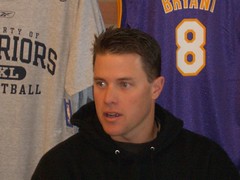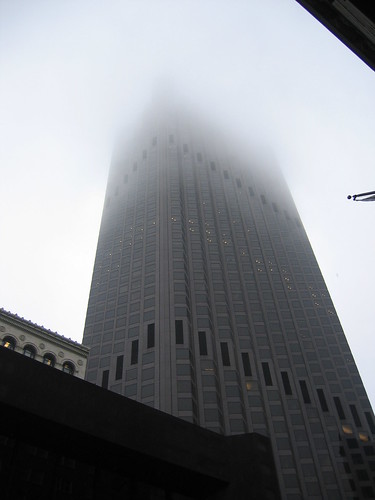Views by the Bay
A journal from someone who is living in the most beautiful place on Earth
Sunday, February 27, 2005
Saturday, February 26, 2005
Not Any Easier
Yesterday my company laid off six people, hardly worth mentioning in a society where takeovers, shutdowns, liquidations, downsizings, “rightsizings”, layoffs, plant closings, reductions-in-force, and plain old firings are routine. These individuals worked in a product line that was barely profitable, and it is easy to see why HQ decided to cut the cord. All of them are smart and capable, and in an improving economy should have little trouble finding a job, with a good chance at finding a better one.
Nevertheless, I am sad. I’ll miss working with or just shooting the breeze with them. I have never gotten used to layoffs, which are now commonplace. In 1982 I became a manager with a staff of four. The economy nosedived, and I had to tell a person whom I had hired six months earlier that he was being let go. Andy had just earned his MBA, and this event undoubtedly derailed his plans. In those days being laid off was a black mark, even one of shame, because it meant something was wrong with you. He rebuffed my attempts to keep in touch with him.
Now, of course, an overwhelming majority of the workforce has experienced a layoff at some point in their career. Everyone handles it better now: employers offer outplacement counseling and communicate regularly with their “alumni” while employees often rethink their life’s direction, undergo training in new skills, really do spend more time with their families, and otherwise make lemonade out of the lemon that they’ve been given. It is no longer considered a negative on one’s resume to have been laid off, and it may be a plus, because how one deals with inevitable problems and setbacks provides a prospective employer with a valuable insight into one’s character.
The system we live under can be harsh, unforgiving, and seemingly unfair, especially when the sword falls on us. This is the dark side of free enterprise’s creative destruction, as people and resources shift to more profitable and innovative sectors of the economy. But it is amazing to me, today, how universal is the acceptance of this aspect of capitalism. When I spoke to my soon-to-be ex-colleagues, the emotions ranged all over the lot, yet none disputed the company’s right to fire its employees.
But once in a while I think of Andy (and Sharon, and Amita, and Ray, and Martha, and Rich, and Steve, and Tess, and Fred, and….) and wonder if he’s doing okay. © 2005 Stephen Yuen
Sunday, February 20, 2005
J.T. in Millbrae

Yesterday afternoon the youngster carefully inserted the picture of Giant’s first baseman J.T. Snow into a plastic bag and tucked the bag under his jacket to protect it from the driving rain. It took 20 minutes to motor the 10 miles north to Millbrae, the wiper blades waving furiously in a vain attempt to sweep the sheets of water from the windshield. We pulled into the crowded parking lot and joined 200 other people outside Lefty’s Sports Collectibles.
Our number was 71, but we were admitted quickly because many autograph-seekers with lower numbers hadn’t arrived yet. J.T. signed the youngster’s picture within half an hour.
In 2004 J.T. Snow had one of his best years when he batted .327, which was 60 points higher than his career average. But to many fans he is worthy of hero-worship because of just one play: in the 2002 World Series he reached back as he was crossing home plate to lift 3-year-old bat boy Darren Baker out of harm’s way. Let us remember this one beneficent, instinctive act in contrast to the behavior of other players who have brought scorn and scandal to the American pastime.

Thursday, February 17, 2005
Social Security's Foggy Future
Campaigning against the moral failings of the previous Administration, the Southern businessman-turned-Governor wins a tightly contested Presidential election. Drawing on Christian principles, he proclaims a new direction in American foreign policy—the promulgation of human rights. The election has given his party comfortable majorities in both houses of Congress, and he decides to tackle a complex problem that affects all sectors of the economy. He concludes that the American people should pay a price now in order to avert a crisis that is decades away. His critics aren’t sure the crisis, or even a problem, exists.
In the litany of failures that marked the Carter Presidency, Mr. Carter aimed high and foundered, not because people didn’t trust his character—he famously and credibly said “I will never lie to you”—but because they didn’t trust his judgment. He was ineffectual in the face of high inflation and unemployment at home and an expansionist Soviet Union abroad. He asked Americans to conserve finite energy supplies by wearing sweaters and turning the heat down. When its citizens were taken hostage in Iran, the mightiest country on Earth could do little more than wring its hands. He was shown the door in an election that wasn’t close.
In contrast with Mr. Carter, President Bush acted vigorously—many say too vigorously--to address the problems that he saw facing the nation. A major tax cut, the prosecution of two wars, and the most significant overhaul of Federal security agencies in the past half century were the product of his first term; his second, with its agenda for Social Security, the reshaping of the Middle East, and effort to curb the spread of nuclear weapons, promises to be similarly eventful. Last summer a long-time Republican supporter worried that life under President Bush was too “exciting” and that the American people would turn to someone else in their longing for “normalcy”.
The columnist may have been right about people’s desires, but, even if that assessment were true, a majority in November evidently decided that the surest way to (re)attain normalcy was to re-elect the man who demonstrated that he is not afraid to change the status quo.
For this President the battle over Social Security, however, may be a bridge too far. A brief listing of a few of the big and complex topics that will be touched on in the coming debate:
As they did when President Carter tried to focus their attention on a dark but distant future of dwindling energy supplies, a weary Mr. and Ms. America’s response to President Bush’s Social Security proposal could be, “do we have to talk about this now?” When the history of this period is written, it may well be said of Mr. Bush that he began the debate that led to changes enacted by later Presidents.
Ideas take time to ripen. The theoretical foundation for the 1981 Reagan tax cuts was laid seven years earlier during the Ford Administration, when economist Arthur Laffer discovered his eponymous curve. And the first significant tax reduction based on Laffer’s theories occurred under President Carter, when the 1978 Steiger Amendment slashed tax rates on capital gains.
My money is on---and will probably be in---personal savings accounts. But the country is not there yet. © 2005 Stephen Yuen
Thursday, February 10, 2005
And to Noodles You Shall Return
The dissonance between two cultures that rub up against each other is familiar enough to be cliche, but yesterday's experience left me bemused. After a frustrating day in which I had to chair a meeting and complete several projects while a part on my computer's motherboard was going bad, I was eager to get home, grab some sustenance and the remote control, and slink into my man-cave.
Joe waved at me as I was trudging to the train. Joe is Italian, but like other Bay Area office workers with postgraduate degrees, fancies himself a multicultural maven. "Gung Hee Fat Choy!" he shouted. Yes, I had nearly forgotten, "Happy Year of the Rooster," I replied. Joe grinned, "You mean Year of the Cock!" A half-dozen rejoinders popped into my mind, but people were beginning to turn their heads, and one of us has to act his age. Besides, he's ex-Navy.
Yes, it was Chinese New Year, but that was not why the mother of my children was pacing the floor at 6:45. "Ash Wednesday services are at 7", she said matter-of-factly, "are you ready to go?" My shoulders sagged involuntarily, but because the youngster was watching me closely, I exercised restraint for the second time in the hour and kept my thoughts to myself.
Ash Wednesday is the first day of Lent, the 40-day period that precedes Easter on the Christian calendar. Lent commemorates Jesus' 40 days in the wilderness, where he was tempted by Satan to abandon his lonely path to the cross. During Lent Christians are supposed to fast, pray, and rid themselves of worldly appetites. The evening service was accordingly somber, as the minister marked each supplicant's forehead with black ashes and intoned, "remember that you are dust and to dust you shall return". The constant reminders of my mortality and sinful nature did the trick, and I walked to the car in a contemplative mood and prepared to meditate, read, and navel-gaze just like I did in college, only now without the aid of controlled substances.
My reverie was broken when the mother of my children declared, "it's New Year, let’s go out to dinner." Thinking about the crowds at the more well-known Chinese restaurants, I pointed the car to the edge of Foster City and went to the obscure but excellent Joy Restaurant. We entered to a cacophony of sound. The room was packed with young Asians toasting each other in Mandarin. At the large tables were groups of families, and in the corner sat a local celebrity trying to converse with a friend over the din. My meditative regimen would have to wait until tomorrow. . © 2005 Stephen Yuen
Saturday, February 05, 2005
A Runny Nose and the Beginnings of Wisdom
A toddler, after rolling on the grass in the front yard, enters the house, his legs covered with hives. His mother dabs gentian violet (not quite the right treatment, but consumer medical knowledge was primitive in the Fifties) to relieve the itching and swelling. Now the welts are dark purple, close to the color of the India ink in his grandfather’s inkwell, and nearly as hard to wash off.
He lives with a runny nose and watery eyes for the rest of his childhood and into his teens. He always carries two handkerchiefs because one is sopping by noon. The doctors say that he is highly allergic to grass and tree pollens. Antihistamines relieve the symptoms but make him very sleepy, so he only takes them at bedtime. He travels thousands of miles across an ocean to attend college, and his hay fever disappears! He decides not to go home and settles in California for career, esthetic, and lifestyle reasons, but surely one consideration was relief from a chronic condition that has plagued him throughout his life.
But ten years later the rhinitis returns. He takes over-the-counter medications, but his condition worsens until some days he can barely function. Finally, he goes to an allergy specialist, where the nurses draw a checkerboard on his back and prick each square with extracts from plants, insects, or animals. Many of the squares become inflamed to the maximum level on the chart. The doctor prescribes immunotherapy injections, and after a couple of months he can function again. However, unlike other patients, his sensitivity to allergens cannot be eliminated, and he must return at least every other week for his shots.
He realizes, now, that the predisposition to allergy is in his genes. His move as a young adult provided only a temporary respite; the body takes its time but always becomes sensitized to the local flora. Running to New Mexico or Arizona isn’t the answer, so he may as well accept the permanence of his condition and live where he’s happy.


